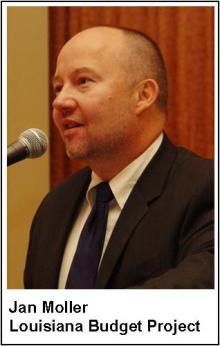Three speakers at the 48th Annual LFT Convention brought important messages about issues that are important to teachers and school employees.
LFT attorney briefs convention on lawsuits

Act 1, which Jindal calls the “talent” bill, bases virtually every aspect of a teacher’s professional life on testing and evaluation, including a controversial way of evaluating some teachers called the “Value Added Model.”
Act 2, called the “choice” bill by the governor, established a statewide voucher program, radically expanded charter schools and created a whole new category of “course providers” which will receive public funds to teach individual courses, some of them online.
(UPDATE: A 19th District Court judge has declared Act 2 unconstitutional. Read details here. A second judge ruled portions of Act 1 unconstitutional on December 18. Read details here).
LFT was joined in the lawsuit against Act 2 by the Louisiana Association of Educators, the Louisiana School Boards Association and more than 40 local school boards. The act is being challenged because it violates a section of the state constitution which reserves Minimum Foundation Program funds for public elementary and secondary schools and to public school systems. Samuel said.
In addition, he said, the bill improperly takes local funds approved by voters for salaries, maintenance and other issues. Vouchers send that money to schools and programs that were not approved by voters, he said.
There is also a technical, but important issue about the way the funding for Act 2 was adopted, Samuel said. LFT attorneys believe that the MFP should be approved by at a majority of the entire House of Representatives, which would have required 53 votes. It actually passed with only 51 votes. The outcome of this issue depends on whether the courts will define the MFP as a law or as a simple resolution.
The suit against Act 2 shares one complaint with our suit against Act 1, Samuel said. It contains too many separate objects to be constitutional.
Acts are not supposed to contain more than one object for a simple reason – lawmakers should not have to accept an object of a bill that they disagree with in order to approve an unrelated object that they want.
Act 1 goes much farther than the “choice” act in violating the object rule, Samuel said. It redefines the relationship between school boards and their superintendents, requires the state education board to review local superintendents’ contracts, changes Reduction in Force policies, changes the duties of principals, and ties teacher evaluations based on student testing to salaries, tenure and termination decisions.
In total, the act amends 26 laws, creates 19 new laws and repeals three laws, Samuel said.
Budget prospects are grim, look for more cuts
Lawmakers will return to Baton Rouge next spring facing yet another budget shortfall, this one

There have been budget shortfalls for the past four years, Moller said, and the resulting cuts have been devastating to health care and higher education in the state. Colleges and universities have lost about half a billion dollars in that time, and vital health care services to the elderly and poor have been slashed.
Public education’s Minimum Foundation Program has been frozen, even as costs to provide education skyrocket.
Between 2008 and 2010, Moller said, state revenues dropped from $10.1 billion to $7.2 billion – a 29% fall.
Why is the state facing such a decline in revenues? Moller pointed to three culprits.
First, he said, about 52% of the decline is due to the recession that began in 2008.
Some 27% of the decline is because the legislature and Gov. Jindal cut income taxes on higher-income citizens when the so-called Stelly Plan was repealed. Those cuts cost the state $2 billion over five years, he said.
Finally, Moller said, about 21% of the loss is due to a decline in mineral revenues, much of which can be traced to generous tax deductions given to energy companies that drill in shale deposits.
As the rest of the country improves financially, Moller said, Louisiana is still struggling. We are one of just 10 states to experience a budget shortfall in 2011-12.
Louisiana Progress calls for “cradle to career” system to help children

Louisiana needs more cooperation and public/private partnerships to eradicate the poverty that she said has a great bearing on student achievement.
There are over 703,000 children in Louisiana public schools, she said, and more than 67 percent of them are on free and reduced lunch.
“The more kids you have in poverty,” she said, “the lower the performance score.”
Flournoy suggested a “cradle to career” system of ensuring student success that includes public/private partnerships, an investment in results, and the use of data more effectively to determine which reforms actually work.
A major improvement would be the alignment of health care services, public education and the criminal justice system, she said,
Investment in quality early childhood care is critical to getting children off to a good start, she said.
“We can’t cut our way to excellence,” she told the convention. “Also, we can’t test our way to excellence.”
